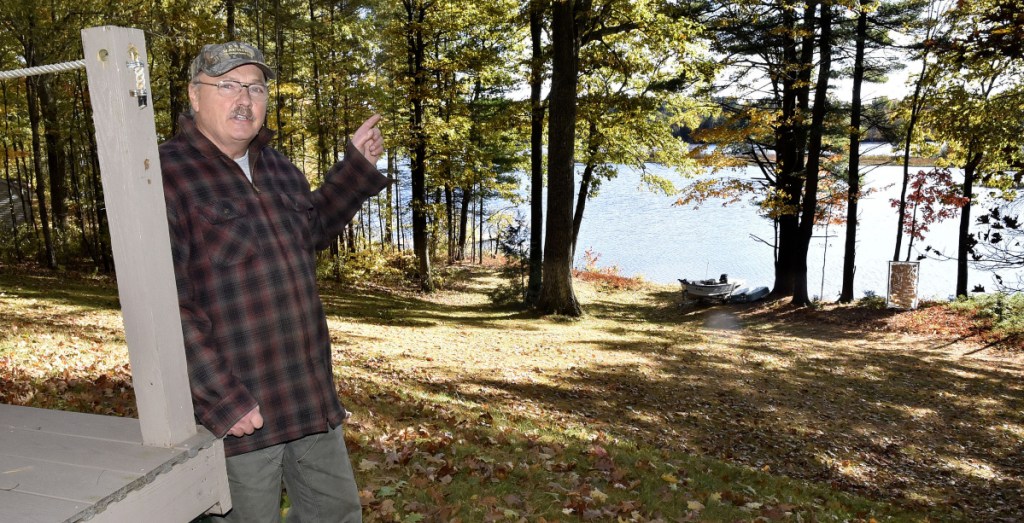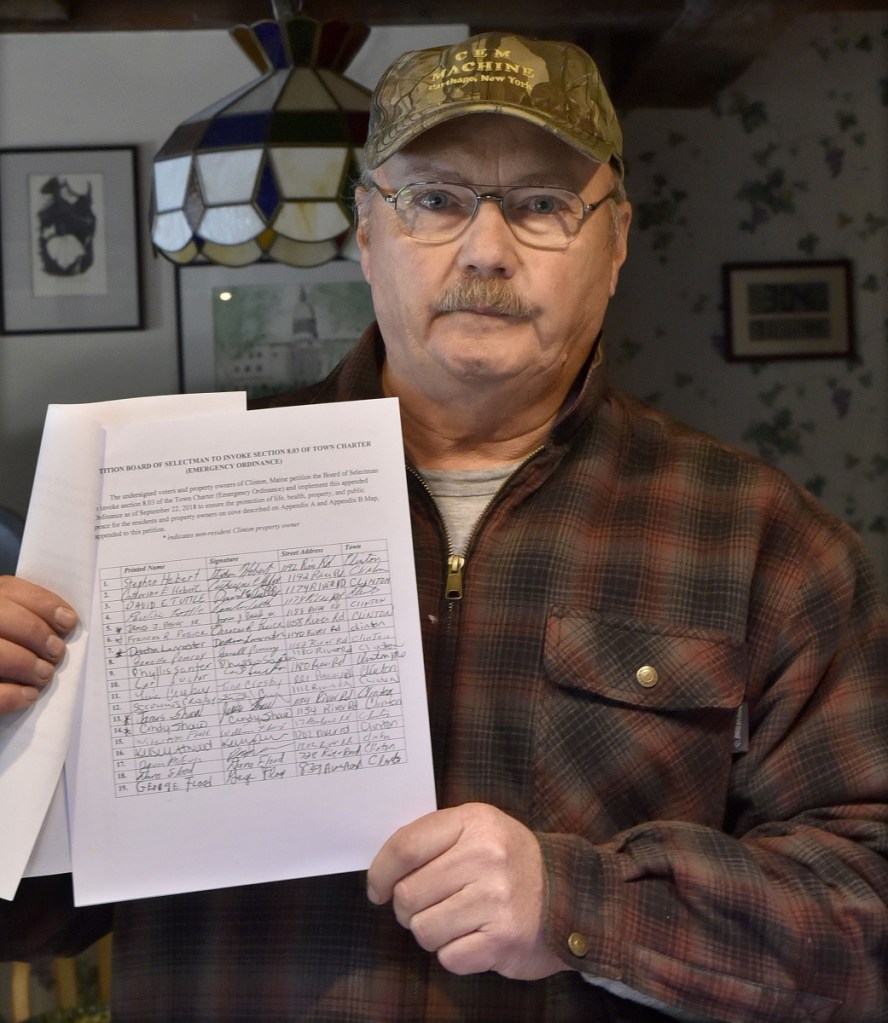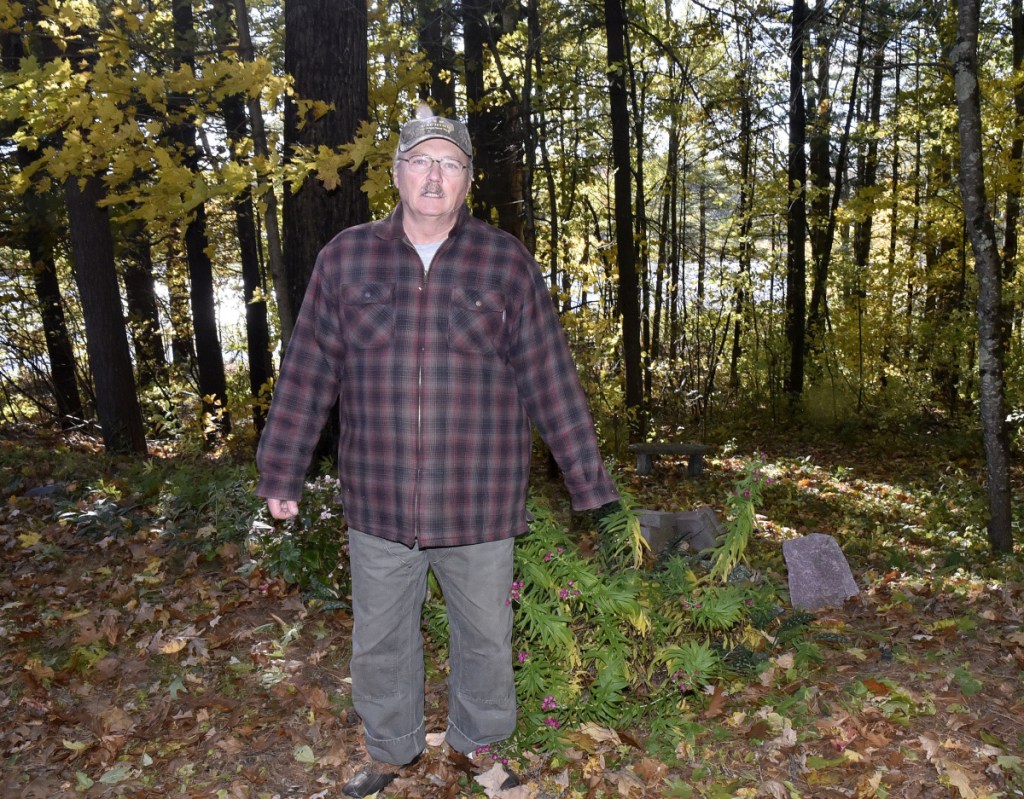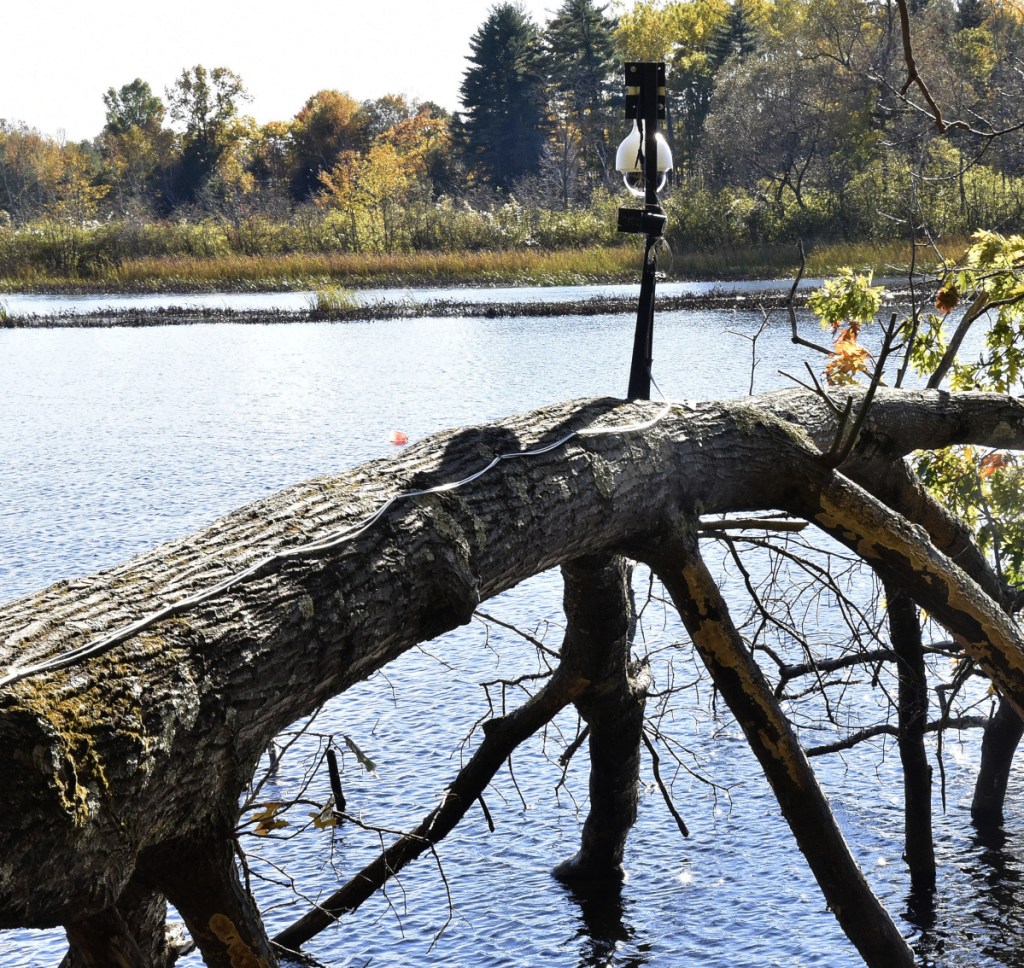CLINTON — A River Road resident has his sights on creating a town ordinance to ban the use of shotguns in a cove near his home on the Kennebec River, saying his family and property have come under fire over the years from duck hunters shooting in the area.
Stephen Hebert, 67, said he has lived on the unnamed cove for 32 years and recalls nine incidents over that time in which, he believes, a projectile has struck his property — including one on a morning about six to eight years ago in which a shotgun pellet bounced off the back of the head of his wife, Catherine, a “sore shot” that did not require medical attention.
Hebert, who hunts deer and grouse but no longer goes after duck, said his recent citizen’s petition push to create a town ordinance prohibiting shotgun discharge in the cove started last October after his house was hit again. He’s been underwhelmed by the response from law enforcement, local and state officials, and hunting clubs over the years, and wouldn’t rule out legal action moving forward.
“It was quiet, until last year,” said Hebert, in a sometimes-emotional interview one calm morning last week at his house. He described activity in the cove as “very loud, very violent” and said that his primary concern is safety for his family and surrounding residents. He called the noise “a frustration” but said they’ve “learned to deal with it” at his house.
Clinton Selectboard Chairman Jeffrey Towne said the board concluded earlier this week that Hebert’s proposed shotgun ordinance would be unconstitutional and unenforceable.
‘GOOD DUCK HUNTING’
State law forbids people to discharge a firearm within 100 yards of a building or dwelling, with some exceptions, such as in the case of a wild animal attacking domestic animals or destroying crops; and it also prohibits a firearm discharge that causes a projectile to pass within 100 yards of a building or dwelling. According to Hebert, the duck hunters set up on a peninsula 200 yards across the cove from his house, a peninsula that shelters the cove from the Kennebec River and provides what Hebert calls “a very good duck hunting spot.”
While the hunters are firing from a position more than 100 yards away, Hebert maintains that shots in the direction of his house are coming closer to his property than the allowed 100 yards, and in some cases are striking his home. Using a range finder, he has set up floating pink milk jugs in the cove to mark the “100-yard distance between that point and my house, which by law no projectile from a firearm of any kind can pass between that point.”
He has also mounted a 4-foot-by-8-foot frame with canvas and fired a 12-gauge shotgun across the cove toward his property to prove that the pellets could travel the distance. Additionally, he said he’s invested $2,000 in cameras positioned by the cove, equipped with facial recognition technology, “because nobody seems to be enforcing the rules, nobody seems to know who they are … and I am going to find out who they are, and who’s shooting, and when they shoot, and what direction they shoot.”
“Now they’re trying to say there’s no danger here,” he said, alleging that the Maine Department of Inland Fisheries & Wildlife, the town and hunting clubs are unresponsive to his concerns. “Now, I’ve asked all these people to come over. I was going to give them a review of this area, of what’s taken place here over the past 20-odd years. Not one of these officials have showed up.”
“I do know he’s been in contact with the department,” DIF&W spokesman Mark Latti said in an interview Friday. “We’ve heard from him. Game wardens have been to his property to investigate.”
Senator Scott Cyrway, a Republican from Albion whose district also includes Benton, Clinton, Fairfield, Unity, Waterville and Winslow, said he’s familiar with Hebert’s concerns, has discussed them with DIF&W Commissioner Chandler Woodcock, and is confident the matter has been investigated.
“We dealt with that many times,” said Cyrway, who was skeptical about shotgun pellets being able to travel the 200-yard distance between the point and Hebert’s home.
“Six hundred feet is two football fields. For a pellet to hit that distance is quite a strong shot,” Cyrway said.
A retired Kennebec County sheriff’s deputy with decades of law enforcement experience, Cyrway said Hebert has a right to have his concerns heard but emphasized the importance of evidence in cases like this.
“We have to have some evidence, and he’s not showing any evidence” Cyrway said. “I don’t know what more we can do on it.”
When told about measures Hebert has taken to document shooting near his property, including cameras and the stand with canvas, Cyrway seemed encouraged and said “that could be evidence.”
The senator added that he would be willing to go to Hebert’s property and assess the situation firsthand.
“If he wants me to come out and see it, I certainly would do that,” Cyrway said. “You don’t want to see anybody hurt. You don’t want to see anybody endangered.”
Sportsman’s Alliance of Maine Executive Director David Trahan said he was in touch with Hebert “quite a while ago” and is vaguely aware of the issue. Trahan, who grew up in Clinton, said he is “pretty familiar” with the town but did not have specific details about the cove or Hebert’s proposal.
While Trahan found it “unbelievable” that DIF&W would not respond to a safety concern and also expressed “doubt that a shotgun is going 150 yards,” he emphasized that SAM’s first priority is safety and that the organization does not want hunters firing in the direction of buildings or people.
“Safety is always first,” said Trahan, who said that if Hebert’s wife was struck by a shotgun pellet, “that’s just unacceptable.”
‘YOU’RE HITTING MY HOUSE’
Over the years, Hebert said he’s alerted numerous hunters about their pellets striking his property and used to keep a canoe that he would use to paddle out to talk to them.
“And every one of them denied. ‘We didn’t hit your house; it’s too far away,'” Hebert said.
He described constant shooting during hunting season, and believes people hunting on the peninsula intend to shoot toward the river and away from the house.
“But the nature of duck hunting with shotguns, it’s a swinging, fast-moving hunting situation,” he said. “When they start swinging, they don’t know where they’re at.”
Hebert said his family could go several years without an event, “but all of a sudden, you get slammed with some shot.”
His concern is specifically limited to shotguns in the cove. He said he has no opposition to firearms or hunting generally and does believe there are safe places to hunt on the peninsula across from his property.
“I’ve had many guns over the years. I shoot. I hunt,” he said. “I’m familiar with them. Am I an expert? No, but I’m familiar with firearms.”
Hebert estimated that he stopped hunting in the cove 30 years ago, and he became emotional when relaying his past concern about shooting toward shore and potentially causing an accident on the road. He has since stopped hunting in the Clinton area altogether, he said.
“I quit hunting around here 10 to 15 years ago,” Hebert said, calling the area “too congested” and no longer fun. “When I hunt, I hunt up in the Danforth area.”
The incident last October that reignited his push for action in the cove involved a group of three hunters whom he eventually confronted.
“I said, ‘Yes, there’s a problem. You’re hitting my house with your pellets,” recounted Hebert, who called the police and eventually was connected with the Maine Warden Service, whose response he didn’t find adequate.
Frustrated, Hebert said he contacted Clinton officials and set up a meeting with the town manager, which eventually led him to the Planning Board.
Clinton Planning Board minutes from Oct. 18, 2017, indicated that the board considered Hebert’s proposed ordinance and raised concerns about its enforceability.
He’s since initiated two petition efforts: one that would have put his proposed shotgun ordinance before voters in November and another that asks the Selectboard to pass the ordinance as an emergency measure.
PUSH FOR ORDINANCE
A packet provided by Hebert says he has initiated his petition effort “because of the minimal response of state and local law enforcement, state officials, hunting club officials, and Clinton town officials to complaints of shooting at his residence.” It also cites several of the alleged incidents in which he says pellets struck his property or family, with some other near misses. The packet includes a petition with 23 signatures and the draft ordinance, which defines the cove area in writing and via diagram.
Phyllis Santer said she and her husband have lived next door to the Heberts for two years, and they support his petition effort because she believes he is trying to protect and support his family. Santer said she and her husband “haven’t had any reason for concern” with shooting in the area.
“Really, it’s pretty quiet out here in the sticks,” she said.
Under Hebert’s ordinance proposal, people would be prohibited from discharging a “shotgun or an instrument capable of discharging pellets into, over or from this restricted area,” which would be limited to the cove on the east side of the Kennebec River and would not include the peninsula itself or the river west of the peninsula. Penalties under the ordinance would include $100 for a first offense, $200 for a second and $500 for any subsequent violations.
“It’s just this water. That’s all we’re trying to do, is get shotguns out of here,” he said. “I’m not trying to stop hunting here. What I’m trying to do is keep the population safe in this area.”
Hebert said his insistence on limiting the proposal to shotguns and applying it only in the cove eventually led to differences with the lawyer he had been working with to structure the document. He declined to identify that lawyer.
“I had a hard time finding a lawyer that would agree to take this,” Hebert said.
Towne, the Clinton Selectboard chairman, said the board ultimately determined Hebert’s proposal would conflict with Maine’s constitution and would be unenforceable.
“The Board concluded that this proposed Ordinance would not be Constitutional and, if enacted, would not be enforceable by the Town,” Towne said in an email Friday. “The area involves the Kennebec River, which is a federally-identified navigable River, with the state of Maine owning the submerged land under the River and the waters being the subject of State and Federal regulation. The State of Maine ‘public trust doctrine’ applies to the River, for the public rights to utilize the River for fishing, fowling, and navigation. The State hunting laws regulate the discharge of firearm, including criminal offenses for violations; and, the Fish and Game regulations limit the size of ammunition and gauge of firearm for waterfowl hunting. And there is Article 1, Section 16 of the State Constitution, the citizen’s right to keep and bear arms.”
Towne added that it was his understanding that Hebert’s “past complaints have been assessed by game wardens and local police, although not to his satisfaction; and, there was no hunting incident this year.”
Clinton Town Manager Earla Haggerty declined to comment on the issue Friday afternoon and deferred to Towne. Haggerty did subsequently say the board decided on Tuesday not to accept the proposed ordinance.
Latti said that DIF&W worked in consultation with the town about the proposed firearms ordinance, as prescribed in state statute, and that the Maine attorney general’s office reviewed the proposal on behalf of the state. Latti also provided an email conversation between town and state officials on the proposal, and noted that the state provides input but does not accept or reject an ordinance concept such as this one.
“It looks like this would be a firearm discharge ordinance within the town’s authority under 30-A MRSA § 3007. The town will need to clearly define the no discharge zone and provide IFW with a copy of any ordinance that is adopted,” Assistant Attorney General Mark Randlett said in an Aug. 31 email. “There may be some limited interference with the public trust activity of fowling on that section of the river, but I think that is an issue for the town to resolve.”
Haggerty responded that day to say both she and Hebert were confused about why the fowling question would be a town issue to resolve.
“There is a public trust right to use the river for fishing, fowling and navigation,” Randlett added in a subsequent email on Sept. 4. “They need to consult with their town attorney to determine whether the limitation the ordinance would pose on fowling would be an unreasonable interference with that right.”
Asked Tuesday morning if he anticipated taking the issue to court, said he does plan to initiate action against any hunter he proves has violated the state firearms discharge law relative to his home.
He hadn’t initiated action against any governing bodies at that time, but said it was a consideration.
“This is as kind as I can put it: I’m very disappointed,” Hebert said about the town’s response to his concerns.
STATE LAW, HUNTER SAFETY
Hebert did not pull punches in his criticism of the state’s firearm discharge law and its enforcement, calling it a “phony, unenforceable law, made to deceive the public that they’re safe, and they’re not, from shotguns.”
He also expressed concern that current hunter safety courses might not be educating Maine hunters about the capability and range of their firearms, though he conceded that he hasn’t taken one of those current courses because he already has a lifetime hunting license.
Latti said the range of various firearms “is something that is discussed in hunter safety classes” and said most hunters are familiar with the state’s discharge law.
“The vast majority of hunters are very aware of that rule, as well as the general safety rule of being aware of your target and what’s beyond it,” Latti said. Hebert similarly said he believes nearly all hunters are responsible, but attributed problems to a “small group.”
When asked if he had concerns about the discharge law’s enforceability, Cyrway didn’t hesitate.
“No, I think it’s very enforceable,” Cyrway said.
According to Latti, there are “relatively few” cases like this one each year, adding that “it certainly happens, and we get complaints about it.”
“The wardens take every case very serious,” Cyrway said.
Calls to a Warden Service spokesman were not returned immediately Friday afternoon.
Matt Junker — 861-9253
Twitter: @mattjunker
Send questions/comments to the editors.







Success. Please wait for the page to reload. If the page does not reload within 5 seconds, please refresh the page.
Enter your email and password to access comments.
Hi, to comment on stories you must . This profile is in addition to your subscription and website login.
Already have a commenting profile? .
Invalid username/password.
Please check your email to confirm and complete your registration.
Only subscribers are eligible to post comments. Please subscribe or login first for digital access. Here’s why.
Use the form below to reset your password. When you've submitted your account email, we will send an email with a reset code.